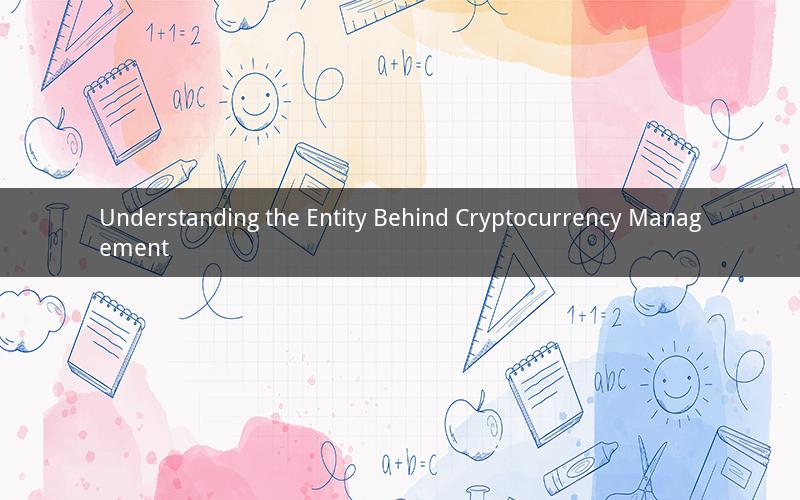
Cryptocurrency, the digital currency that has taken the financial world by storm, has sparked an unprecedented level of interest among investors and enthusiasts. With its decentralized nature, many wonder who manages cryptocurrency and how it operates. In this article, we will delve into the various entities responsible for managing and maintaining the integrity of cryptocurrencies.
1. Blockchain Technology
At the heart of every cryptocurrency lies the blockchain, a decentralized and distributed ledger technology. The blockchain ensures the security, transparency, and immutability of transactions. While the blockchain itself is managed by its participants, the following entities play crucial roles in its maintenance and operation.
1.1 Miners
Miners are individuals or organizations that validate and secure transactions on the blockchain. They use powerful computers to solve complex mathematical puzzles, which helps maintain the integrity of the network. In return for their efforts, miners are rewarded with new cryptocurrency tokens.
1.2 Nodes
Nodes are devices connected to the blockchain network that store and share transaction information. They help to validate transactions and ensure the network's decentralized nature. Nodes can be run by individuals, organizations, or even governments.
2. Cryptocurrency Exchanges
Cryptocurrency exchanges are platforms where users can buy, sell, and trade cryptocurrencies. These exchanges act as intermediaries between buyers and sellers, facilitating the exchange of digital assets. The following entities play a role in managing these exchanges.
2.1 Exchange Operators
Exchange operators are responsible for the overall management and operation of cryptocurrency exchanges. They ensure compliance with regulations, maintain the platform's security, and provide customer support.
2.2 Auditors
Auditors are independent professionals who review the operations of cryptocurrency exchanges to ensure transparency and compliance with regulations. They examine the exchange's financial records, security measures, and internal controls.
3. Regulatory Bodies
Regulatory bodies are government organizations responsible for overseeing and regulating the cryptocurrency market. These entities play a crucial role in managing and ensuring the integrity of cryptocurrencies.
3.1 Financial Regulatory Authorities
Financial regulatory authorities, such as the Securities and Exchange Commission (SEC) in the United States and the Financial Conduct Authority (FCA) in the United Kingdom, regulate the trading of cryptocurrencies and ensure compliance with financial laws and regulations.
3.2 Central Banks
Central banks, such as the Federal Reserve in the United States and the European Central Bank (ECB) in the European Union, are responsible for overseeing the stability and integrity of the financial system. They may also play a role in regulating cryptocurrencies and their impact on the economy.
4. Cryptocurrency Wallets
Cryptocurrency wallets are digital tools used to store, send, and receive cryptocurrency. These wallets can be managed by individuals, organizations, or even governments.
4.1 Individual Wallets
Individuals can manage their own cryptocurrency wallets, which can be software-based (desktop, mobile, or web) or hardware-based (physical devices). Users are responsible for their wallet's security and the private keys that grant access to their cryptocurrency.
4.2 Institutional Wallets
Institutional wallets are managed by organizations, such as banks, exchanges, and other financial institutions. These wallets are designed to store large amounts of cryptocurrency and offer enhanced security features, such as multi-factor authentication and cold storage.
5. Conclusion
In conclusion, cryptocurrency management is a complex and multifaceted process involving various entities. From blockchain technology to regulatory bodies and cryptocurrency wallets, each entity plays a crucial role in ensuring the integrity, security, and stability of the cryptocurrency market.
Questions and Answers:
1. Question: What is the primary role of miners in the cryptocurrency ecosystem?
Answer: Miners validate and secure transactions on the blockchain, ensuring the integrity and immutability of the network. In return for their efforts, they are rewarded with new cryptocurrency tokens.
2. Question: How do cryptocurrency exchanges ensure the safety of users' funds?
Answer: Cryptocurrency exchanges implement robust security measures, such as two-factor authentication, cold storage for large amounts of cryptocurrency, and regular audits. They also comply with financial regulations to maintain transparency and trust among users.
3. Question: Can governments regulate cryptocurrencies without affecting their decentralized nature?
Answer: While it may be challenging to fully regulate cryptocurrencies without affecting their decentralized nature, governments can still implement regulations to ensure the integrity of the financial system and protect consumers from fraudulent activities.
4. Question: How do individuals manage their cryptocurrency wallets?
Answer: Individuals can manage their cryptocurrency wallets using software-based wallets (desktop, mobile, or web) or hardware-based wallets (physical devices). It is essential to keep private keys secure and follow best practices for wallet security.
5. Question: What are the potential risks associated with managing cryptocurrency?
Answer: The potential risks include loss of private keys, theft of funds, and exposure to regulatory changes. It is crucial for individuals and organizations to stay informed about the latest developments in the cryptocurrency market and implement robust security measures to mitigate these risks.